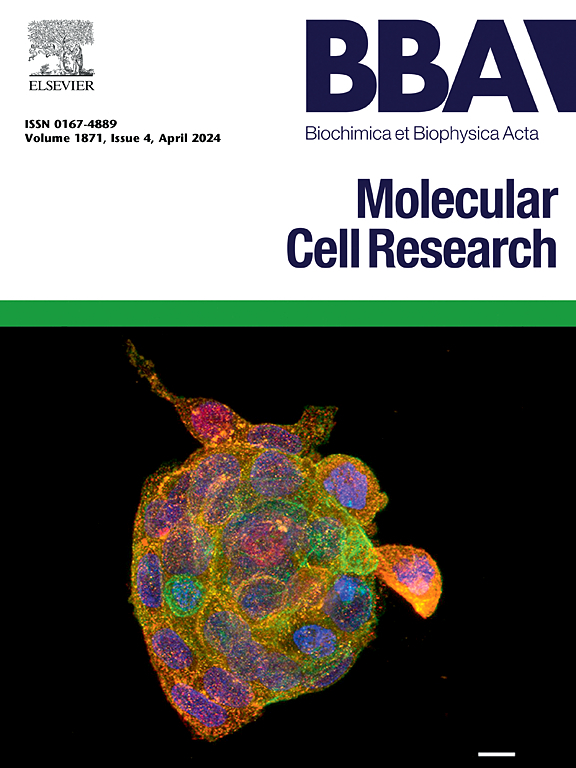RANKL regulates differentially breast cancer stem cell properties through its RANK and LGR4 receptors
IF 4.6
2区 生物学
Q1 BIOCHEMISTRY & MOLECULAR BIOLOGY
Biochimica et biophysica acta. Molecular cell research
Pub Date : 2025-02-01
DOI:10.1016/j.bbamcr.2024.119888
引用次数: 0
Abstract
Background
Breast cancer stem cells (BCSC) are a subpopulation responsible for cancer resistance and relapse. The receptor activator of nuclear factor kappa-Β ligand (RANKL) is a cytokine capable of activating RANK and LGR4 receptors. RANKL/RANK signaling maintains the self-renewal of BCSCs, however, the effect of RANKL via LGR4 remains unclear. Evidence from osteoclasts suggests that RANKL/LGR4 axis disrupts RANK signaling, leading to opposing cellular responses. Anti-RANKL inhibitors are potential agents for eradicating CSCs, but their effect on RANKL/LGR4 signal has not been demonstrated.
Objective
This project aimed to elucidate the role of RANKL in regulating stemness depending on the expression of its receptors.
Methods
We use in vitro and in vivo approaches to evaluate the effects of RANKL inhibition in stemness in low or high-LGR4 expressing cells. Furthermore, we analyze the effects of RANKL stimulation on the stemness of LGR4 or RANK overexpressing cells. Additionally, we evaluated the impact of RANKL/LGR4 signaling in the activity of Wnt/β-catenin and NF-κB signaling pathways.
Results
Our findings indicated that elevated RANKL expression is related to a favorable prognosis in patients with high LGR4 levels. Furthermore, RANKL inhibition decreased BCSC properties in LGR4-low cell lines, while it promoted migration in LGR4-high cells. Additionally, the RANKL/RANK axis activated NF-κB signaling and enhanced BCSCs in RANK-overexpressing cells. In contrast, in LGR4-overexpressing cells, RANKL failed to activate NF-κB but instead inhibited the Wnt/β-catenin pathway, leading to a reduction in BCSCs.
Conclusion
Our findings suggest that RANKL exerts different responses according to the expression of its receptors.

RANKL通过其RANK和LGR4受体调控乳腺癌干细胞的差异特性。
背景:乳腺癌干细胞(BCSC)是一个负责癌症抵抗和复发的亚群。核因子κ κ -Β配体受体激活因子(RANKL)是一种能够激活RANK和LGR4受体的细胞因子。RANKL/RANK信号维持BCSCs的自我更新,然而,RANKL通过LGR4的作用尚不清楚。来自破骨细胞的证据表明,RANKL/LGR4轴破坏RANK信号,导致相反的细胞反应。抗RANKL抑制剂是清除CSCs的潜在药物,但其对RANKL/LGR4信号的影响尚未得到证实。目的:本项目旨在阐明RANKL通过其受体的表达调控干细胞的作用。方法:采用体外和体内两种方法,对低表达或高表达lgr4的细胞进行RANKL抑制对干细胞的影响。此外,我们分析了RANKL刺激对LGR4或RANK过表达细胞的干性的影响。此外,我们评估了RANKL/LGR4信号通路对Wnt/β-catenin和NF-κB信号通路活性的影响。结果:我们的研究结果表明,在高LGR4水平的患者中,RANKL表达升高与良好的预后有关。此外,RANKL抑制降低了lgr4低的细胞系的BCSC特性,而促进了lgr4高的细胞的迁移。此外,RANKL/RANK轴激活NF-κB信号通路,并在RANK过表达的细胞中增强BCSCs。相比之下,在lgr4过表达的细胞中,RANKL不能激活NF-κB,而是抑制Wnt/β-catenin通路,导致BCSCs减少。结论:RANKL根据其受体的表达而产生不同的反应。
本文章由计算机程序翻译,如有差异,请以英文原文为准。
求助全文
约1分钟内获得全文
求助全文
来源期刊
CiteScore
10.00
自引率
2.00%
发文量
151
审稿时长
44 days
期刊介绍:
BBA Molecular Cell Research focuses on understanding the mechanisms of cellular processes at the molecular level. These include aspects of cellular signaling, signal transduction, cell cycle, apoptosis, intracellular trafficking, secretory and endocytic pathways, biogenesis of cell organelles, cytoskeletal structures, cellular interactions, cell/tissue differentiation and cellular enzymology. Also included are studies at the interface between Cell Biology and Biophysics which apply for example novel imaging methods for characterizing cellular processes.

 求助内容:
求助内容: 应助结果提醒方式:
应助结果提醒方式:


